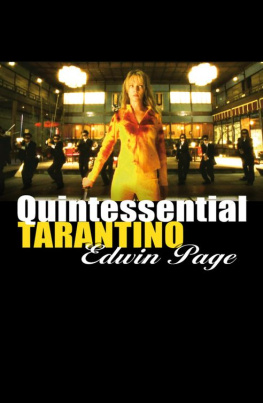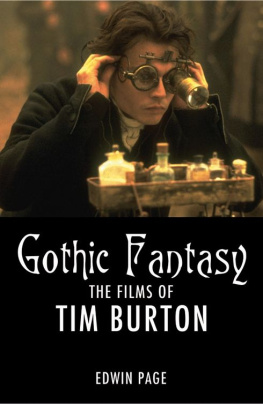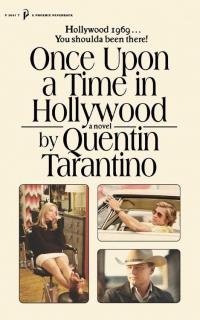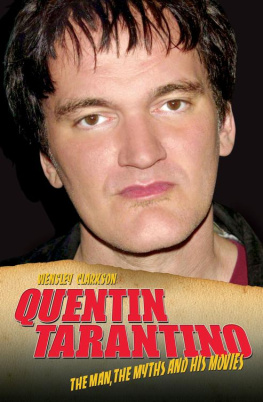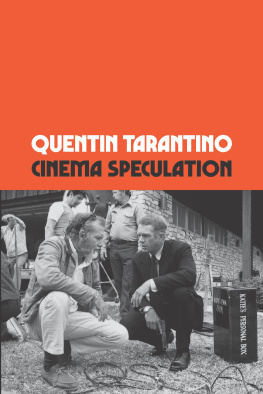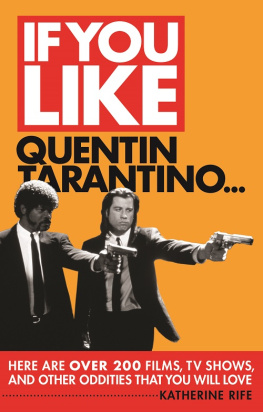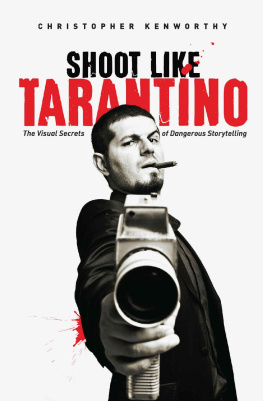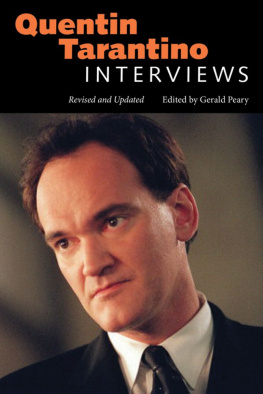Storytelling has become a lost art. There is no storytelling, theres just situations. Very rarely are you told a story.
Quentin Tarantino
In this book youll find guns, gangsters, gimps and sword-slashing heroines, all served with a large side-order of blood and gore. Youll journey through the films Tarantino has either written or both written and directed, and follow the threads of his stories to find out where they lead.
The story begins with Reservoir Dogs (1992), the first film written and directed by Quentin Tarantino, and ends with Kill Bill Volume 2 (2004). In all he has only written and directed five films, which may seem like a small amount considering the size of his reputation. However, its the content of the films, along with their popularity, that has seen his reputation grow.
Also included is a chapter on the film Four Rooms (1995), Tarantino having written and directed one of its four parts. Further to this is Chapter Eleven, which takes a look at the episodes of TV shows ER and CSI that were given the Tarantino treatment. The discussion of all his work so far means you are getting a complete view of the mans talent, and can see the results of his writing and directing both together and separately.
When you go to see a Tarantino film you go to the cinema knowing to expect a degree of violence, a good dose of humour and an injection of adrenalin-fuelled action, all carried out by characters you cant help but be interested in. Its because of these things that millions of people all around the world come out of theatres feeling exhilarated by a cinematic experience Tarantino delivers with style and panache.
Any admiration for Tarantinos work also has to include his writing ability, which encompasses his highly original use of literary techniques. Tarantino has successfully toyed with time again and again, giving audiences non-linear narratives which excite and thrill in their texture of past, present and future, all woven expertly together by a master of screenwriting. He has also utilised chapters which, in the case of Reservoir Dogs especially, helped to strengthen character and add depth to the plot.
Even Tarantinos casting choices are admirable. How many other directors would have had the courage or foresight to cast John Travolta in a lead role in Pulp Fiction after his career had all but flatlined? This can also be said of Pam Grier (Jackie Brown), David Carradine (Kill Bill Volume 2) and Daryl Hannah (Kill Bill Volume 1 & 2) to varying degrees. These choices have worked perfectly however, sometimes resulting in brilliant displays of on-screen chemistry not often seen in contemporary cinema, such as that between Travolta and Samuel L. Jackson in Pulp Fiction and Pam Grier and Robert Forster in Jackie Brown.
In all areas it would seem that Tarantinos touch is more golden than the glow from the briefcase in Pulp Fiction. He has the Midas touch, as his studio Miramax knows only too well, his films having helped to make them a major force in Hollywood. But this special touch goes beyond mere appearances, beyond the plot, characters, and acting.
Tarantino displays an immense love and knowledge of cinema and films in his work. And when I say cinema I mean on a global scale, not merely limited to American cinema, but stretching to European cinema, such as the French New Wave, and on to Asian cinema, including Japanese monster movies and Chinese and Japanese martial arts films.
This deep passion for all things film shines through on screen. There is a special care taken over every frame and numerous homages and references to other movies are evident in his work. The latter becomes especially obvious in the Kill Bill saga, as we shall see later.
Tarantinos films stand out from most others that have been produced in the last two decades and can be enjoyed on a number of levels. Thats why this book doesnt just scratch the surface of his films, but digs deep with sharp nails in order to get to the life-blood beneath.
At the end of Chapter One are the credits for Tarantinos film and television career at the time of writing this book. There are also cast and selected crew listings at the end of chapters Two to Ten, all adding to the information at your fingertips. The source for these was The Internet Movie Database, which is a great resource for all film lovers.
This work could have been a cold look at high-octane action and searing scenarios, but instead its more like a Royale with cheese. Youre here to enjoy the ride and find out more about films which contain powerful imagery and strong themes. Tarantinos intelligent plots, postmodern narratives, three-dimensional characters, entertaining dialogue and gripping action sequences are a blend far finer than the coffee his character, Jimmie, serves up in Pulp Fiction.
Now its time to read on and let the story begin. As Jules says to Vincent in Pulp Fiction: Lets get into character.
Endnote
.Smith, G. Quentin Tarantino: When you know youre in good hands (Film Comment, July-August, 1994)
When people ask me if I went to film school I tell them No, I went to films
Quentin Tarantino
Quentin Jerome Tarantino was born on March 27th 1963 in Knoxville, Tennessee, USA. His association with film apparently started immediately, his mother, Connie, naming him after Quint, Burt Reynolds character in Gunsmoke (Juran, 1953).
He was brought up in suburban Los Angeles by Connie, who took the young Tarantino to the cinema regularly. At the age of eight he saw Carnal Knowledge (Nichols, 1971) and at nine he saw Deliverance (Boorman, 1972)., which remain some of his favourite films. These cinema visits became a habit of his and he has always treated himself to a movie on his birthday.
PULP FACT
Tarantino never went to film school.
Tarantino dropped out of the ninth grade at junior high and is proud to have achieved what he has despite his lack of education. Hed hide in his house until Connie, a nurse, went to work. Then hed spend the day watching television or looking through his comic collection, gaining an education of a different kind which would prove useful in later life. This love of movies and comics is clear in his films, and the two combine most notably in True Romance. Who would ever have thought that skipping school could have turned out so well?
At the age of sixteen Tarantino took acting classes while working at porno cinemas. It was during this time that he started writing film scripts.
PULP FACT
Tarantino wrote his first screenplay Captain Peachfuzz and the Anchovy Bandit in 1985.
He got a job in Video Archives, a video store in Manhattan Beach, California, when he was twenty-two. It was at Video Archives that Tarantino and Roger Avary, who wrote parts of Reservoir Dogs and Pulp Fiction, spent all day watching, discussing and recommending videos.
Lance Lawson, manager of the video store where Tarantino worked has said that he read an extreme amount of thrillers and comics, loved Elvisand always celebrated his birthday by going to the movies. Tarantinos early life is reflected in a number of his films. The most notable example is in True Romance, which is arguably the most autobiographical of Tarantinos scripts, probably because it was one of his earliest. In it Clarence always goes to the movies on his birthday, his hero is Elvis, and he loves comics.
Tarantinos wide knowledge of cinema no doubt arose from his regular cinema visits and his video store job. Without his particular upbringing and the job at Video Archives it is unlikely that Tarantinos films would have the referential nature that we know and love.

